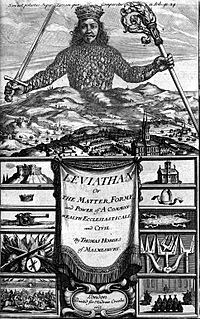Social contract facts for kids

The social contract is a theory that suggests that individuals have agreed to give up some of their freedoms and submit to the authority (of the ruler, or to the decision of a majority) in exchange for protection or maintenance of the social order. The term takes its name from The Social Contract (French: Du contrat social ou Principes du droit politique), a 1762 book by Jean-Jacques Rousseau that discussed this concept. The social contract was a popular theory from the mid-17th to early 19th centuries.
The central point of the social contract theory is that law and political order are not natural, but human creations.
The first modern philosopher to put forward a detailed contract theory was Thomas Hobbes (1588–1679). According to Hobbes, in a "state of nature", human life would be "solitary, poor, nasty, brutish and short". Without political order and law, everyone would have unlimited natural freedoms, including the "right to all things"; there would be an endless "war of all against all" (bellum omnium contra omnes). To avoid this, free men contract with each other to establish political community (civil society) through a social contract in which they all gain security in return for subjecting themselves to an absolute sovereign, one man or an assembly of men. Hobbes suggested that humans agreed to abdicate their rights in favor of the absolute authority of government.
Philosophers
- Thomas Hobbes
- John Locke
- Jean-Jacques Rousseau
- Pierre-Joseph Proudhon
- John Rawls
- David Gauthier
- Philip Pettit
Other pages
See also
 In Spanish: Contrato social para niños
In Spanish: Contrato social para niños

